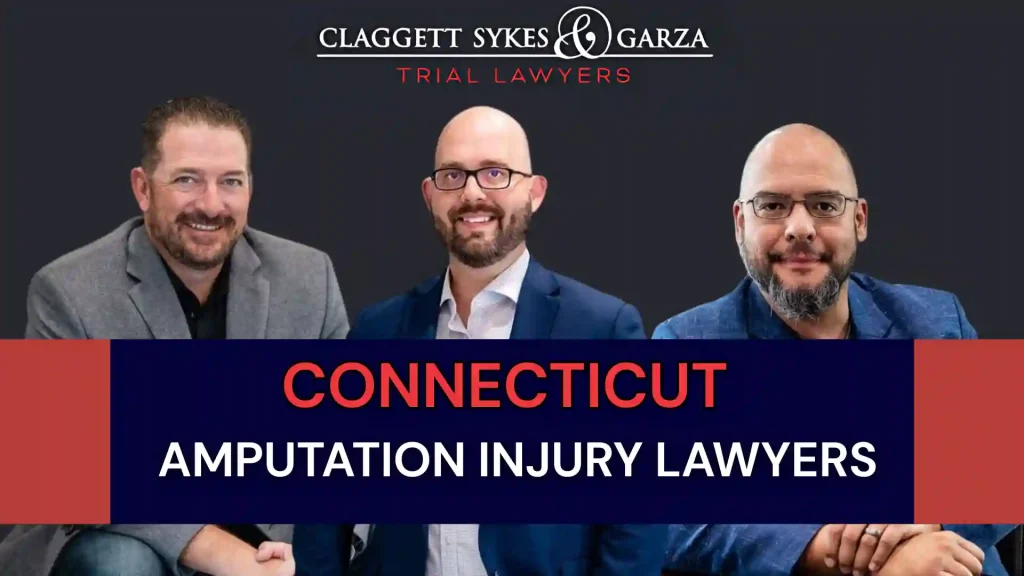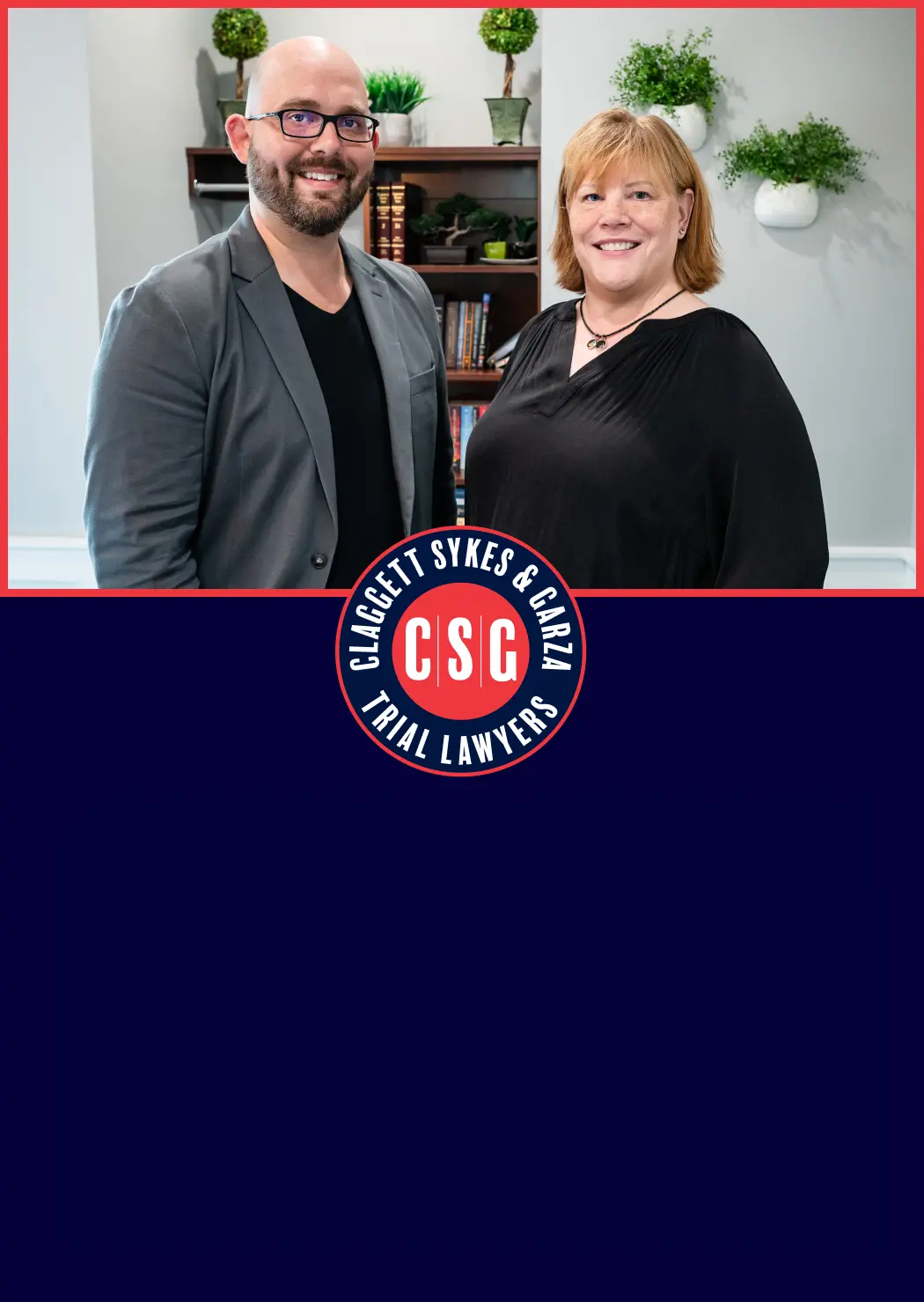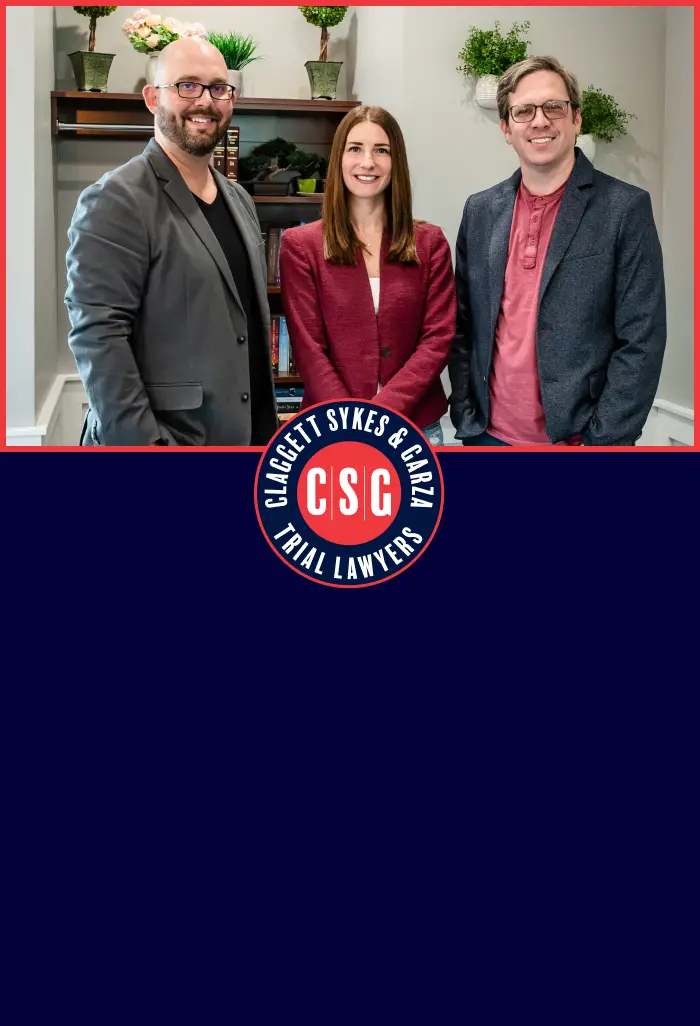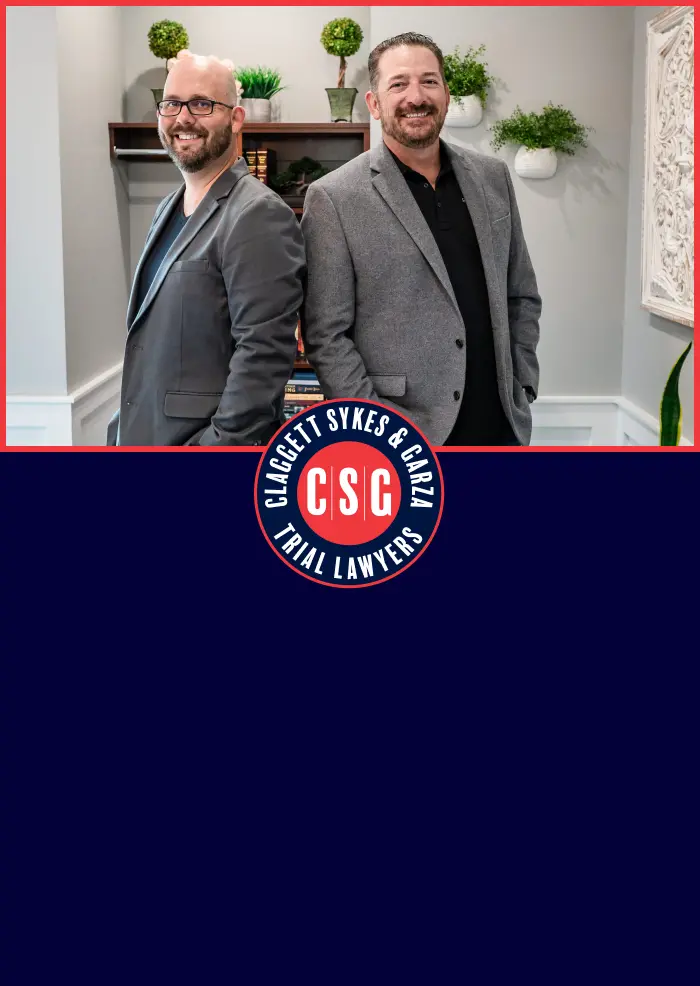

When an amputation injury changes your life forever, you need legal representation that understands the profound impact of limb loss. At Claggett, Sykes & Garza Trial Lawyers, our legal team has secured record-breaking verdicts for catastrophic injury victims, including the largest bodily injury verdict in Connecticut history at $100 million. Our dedicated Amputation Injury Lawyers in Connecticut focus exclusively on severe injury cases. Guided by our “Big Hearts, Big Data, Big Justice” approach, we bring compassion, resources, and proven strategies to every amputation injury claim we handle—helping clients rebuild their lives with strength and dignity.
Why Choose an Amputation Injury Lawyer from Claggett, Sykes & Garza Trial Lawyers?
With over $1 billion in verdicts and settlements, our legal team combines decades of trial experience with cutting-edge case preparation techniques to maximize compensation for amputation injury victims. Our Connecticut amputation injury lawyers have built a reputation for achieving exceptional results in challenging catastrophic injury cases.
Andrew Garza, our Co-Founder and Chief Legal Officer, earned recognition as the 2022 Keenan Trial Institute Trial Lawyer of the Year and has been named to Super Lawyers from 2016-2023. Partner Sean Claggett brings his experience as the Nevada Justice Association’s 2017 Trial Lawyer of the Year, while our entire team maintains AV Preeminent ratings from Martindale-Hubbell.
Our focused approach allows us to dedicate the substantial resources necessary for complex amputation injury litigation, including medical expert consultations, life care planning, and comprehensive damage analysis.

Get the Compensation You Deserve. Our Experienced Lawyers Can Help.
Understanding Amputation Injuries in Connecticut
Amputation injuries represent some of the devastating personal injuries, fundamentally altering a victim’s physical capabilities, emotional well-being, and financial future. These injuries involve the complete or partial loss of limbs or extremities, requiring immediate medical intervention and long-term rehabilitation according to Mayo Clinic rehabilitation guidelines.
Traumatic vs. Surgical Amputations
Traumatic amputations occur suddenly due to accidents, where the limb becomes severed at the scene. These emergencies require immediate medical attention and often result in additional complications from blood loss, infection, and tissue damage. Surgical amputations happen in controlled medical settings when doctors determine that removing a limb will save a patient’s life or prevent further medical complications.
Phantom Limb Pain and Complications
Many amputation injury victims experience phantom limb pain, where they continue to feel sensations in the missing limb. This neurological phenomenon can persist for years and requires specialized pain management treatment according to the National Institute of Health. Additional complications may include infection at the amputation site, problems with prosthetic fitting, and psychological adjustment challenges that require ongoing counseling and support.
Common Causes of Connecticut Amputation Injuries
Connecticut amputation injuries occur across various settings, with workplace accidents, motor vehicle collisions, and medical malpractice representing the leading causes. Understanding these common scenarios helps identify potential liability and build stronger legal claims.
Industrial and construction work environments present elevated risks for amputation injuries. Heavy machinery, power tools, and manufacturing equipment can cause severe crushing injuries or direct severing of limbs. Motor vehicle accidents, particularly those involving commercial trucks or motorcycles, can result in traumatic amputations due to the extreme forces involved in high-speed collisions.
Connecticut Workplace Safety Statistics
Workplace injuries in Connecticut occur across various industries, with manufacturing, construction, and agriculture presenting particular risks for serious injuries, including amputations. According to the Connecticut Department of Public Health, amputation rates vary significantly by demographic factors. These injuries often involve violations of Occupational Safety and Health Administration (OSHA) standards, creating potential third-party liability claims beyond workers’ compensation benefits.
Product Liability in Amputation Cases
Defective machinery, tools, or safety equipment can cause amputation injuries when manufacturers fail to include proper safety guards or warning labels. Our Connecticut product liability attorneys have extensive experience handling claims against manufacturers, distributors, and retailers of dangerous products that cause limb loss.

Let Us Fight for Your Rights and Maximize Your Compensation.
Connecticut Amputation Injury Laws and Legal Rights
Connecticut personal injury law provides multiple avenues for amputation injury victims to seek compensation, depending on the circumstances surrounding their injury. Understanding these legal options helps ensure victims pursue all available claims for maximum recovery.
Connecticut Statute of Limitations on Amputation Injuries
The Connecticut statute of limitations for personal injury claims, including amputation injuries, is generally two years from the date of injury. However, certain circumstances can extend or modify this deadline, making it crucial to consult with experienced Connecticut personal injury lawyers promptly after an amputation injury occurs.
Workers’ Compensation Claims
Workers’ compensation claims provide immediate medical benefits and wage replacement for workplace amputation injuries, but these benefits often fall short of covering the full extent of damages. Third-party liability claims against equipment manufacturers, property owners, or other negligent parties can provide additional compensation beyond workers’ compensation limits.
Modified Comparative Negligence
Connecticut courts apply a modified comparative negligence rule, meaning amputation injury victims can recover damages even if they bear some responsibility for their accident, as long as their fault does not exceed 50 percent of the total negligence involved.

Experienced Personal Injury Lawyers Ready to Assist You.
Amputation Injury Compensation in Connecticut
Amputation injury compensation in Connecticut encompasses both economic and non-economic damages designed to address the comprehensive impact of limb loss on victims and their families. Economic damages encompass all quantifiable financial losses, while non-economic damages compensate for intangible harms like pain and suffering.
Medical expenses for amputation injuries often exceed hundreds of thousands of dollars, including emergency treatment, surgical procedures, hospital stays, rehabilitation, and ongoing medical care. According to research published in the AMA Journal of Ethics, lifetime healthcare costs for amputees can exceed $500,000. Prosthetic devices alone can cost between $3,000 and $70,000 for basic to advanced models, with advanced computerized prosthetics reaching $100,000 or more.
Lost wages and diminished earning capacity represent major components of amputation injury compensation. Many victims cannot return to their previous occupations and require vocational retraining or career changes that result in reduced lifetime earnings.
Average Costs of Prosthetic Devices
Modern prosthetic technology offers remarkable functionality but comes with substantial costs. Basic prosthetic arms range from $4,000 to $75,000, while advanced myoelectric prosthetics can exceed $100,000. Lower limb prosthetics typically cost between $3,000 and $70,000, with specialized sports or activity-specific prosthetics adding additional expenses according to the American Academy of Orthotists and Prosthetists. Mayo Clinic research indicates that prosthetic knee type significantly influences ongoing care costs and rehabilitation outcomes.
Lifetime Care Planning
Comprehensive life care planning for amputation injury victims addresses ongoing medical needs, prosthetic replacements, home modifications, vehicle adaptations, and psychological counseling. These plans often project costs exceeding $1 million over a victim’s lifetime, emphasizing the importance of securing adequate compensation through legal action with experienced Connecticut catastrophic injury attorneys.
How Our CT Amputation Injury Attorneys Handle Cases
Our Connecticut amputation injury attorneys employ a comprehensive approach that begins with thorough case investigation and medical expert consultation. We work with leading prosthetists, rehabilitation specialists, and life care planners to document the full extent of our clients’ injuries and future needs following VA/DoD clinical practice guidelines.
Our “Big Data” approach involves analyzing thousands of similar cases to identify patterns, successful strategies, and optimal settlement ranges. This data-driven methodology, combined with our trial experience, helps us build compelling cases that achieve maximum compensation for amputation injury victims.
We maintain relationships with top medical experts across the country who can testify about the cause of amputation injuries, the adequacy of medical treatment, and the long-term prognosis for our clients. This expert testimony often proves crucial in establishing liability and demonstrating the full extent of damages.
Our Track Record in Catastrophic Injury Cases
Our legal team’s track record includes the $100 million verdict for a warehouse worker who suffered paralysis, demonstrating our ability to secure substantial compensation for catastrophic injuries. While each case presents unique circumstances, our experience with high-stakes litigation provides the foundation for achieving exceptional results in amputation injury cases.
Connecticut Amputation Injury Case Results and Verdicts
Our Connecticut amputation injury case results reflect our commitment to achieving justice for catastrophic injury victims. While we cannot guarantee specific outcomes, our track record demonstrates consistent success in securing substantial compensation for clients facing life-altering injuries.
$100 Million Dollar Verdict in CT
The $100 million verdict we secured for a catastrophic injury victim represents the largest bodily injury verdict in Connecticut history. This case involved extensive medical testimony, life care planning, and economic analysis to demonstrate the full impact of the injury on our client’s life and future.
Our Approach
Our approach to amputation injury cases involves comprehensive preparation, including detailed medical record review, expert witness preparation, and thorough investigation of all potential sources of liability. We understand that amputation injury victims face unique challenges and work tirelessly to ensure they receive compensation that addresses their specific needs.
Contact Claggett, Sykes & Garza Trial Lawyers
If you or a loved one has suffered an amputation injury in Connecticut, contact our experienced legal team for a free consultation. We have an office in Farmington at 860-471-8333. Our Connecticut amputation injury lawyers are ready to fight for the compensation you deserve. We work on a contingency fee basis, meaning you don’t have to pay unless we win your case.
Connecticut Amputation Injury Lawyer FAQs
How long do I have to file an amputation injury claim in Connecticut?
Connecticut law generally provides two years from the date of injury to file a personal injury lawsuit. However, certain circumstances can extend this deadline, and workers’ compensation claims have different time requirements. Consulting with an experienced amputation injury lawyer promptly after your accident ensures you do not miss important deadlines.
What if my amputation was caused by a workplace accident?
Workplace amputation injuries typically qualify for workers’ compensation benefits, which provide medical coverage and wage replacement regardless of fault. However, third-party liability claims against equipment manufacturers, contractors, or other negligent parties may provide additional compensation beyond workers’ compensation limits.
How much is my amputation injury case worth?
Amputation injury case values depend on numerous factors, including the location and extent of the amputation, your age and occupation, medical expenses, lost earning capacity, and the degree of negligence involved. Our legal team provides comprehensive case evaluations to help you understand the potential value of your claim.
Do I need to pay attorney fees up front?
We handle amputation injury cases on a contingency fee basis, meaning you pay no attorney fees unless we secure compensation for your case. This arrangement allows amputation injury victims to access experienced legal representation without upfront costs during an already challenging time.
What if the insurance company offers a settlement?
Insurance companies often make quick settlement offers that fall far short of the true value of amputation injury claims. Our legal team reviews all settlement offers and advises clients on whether proposed settlements adequately compensate for their injuries and future needs.

